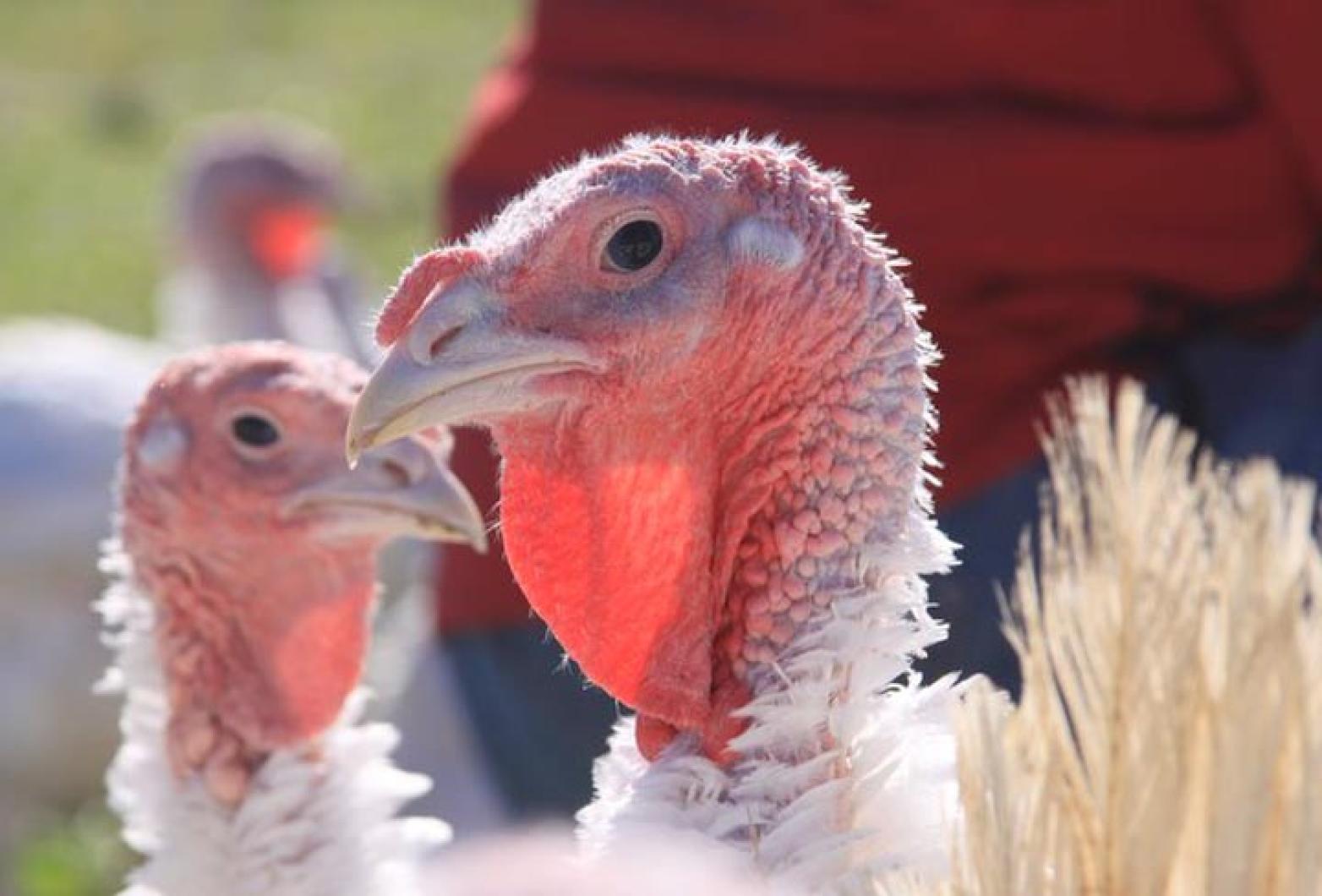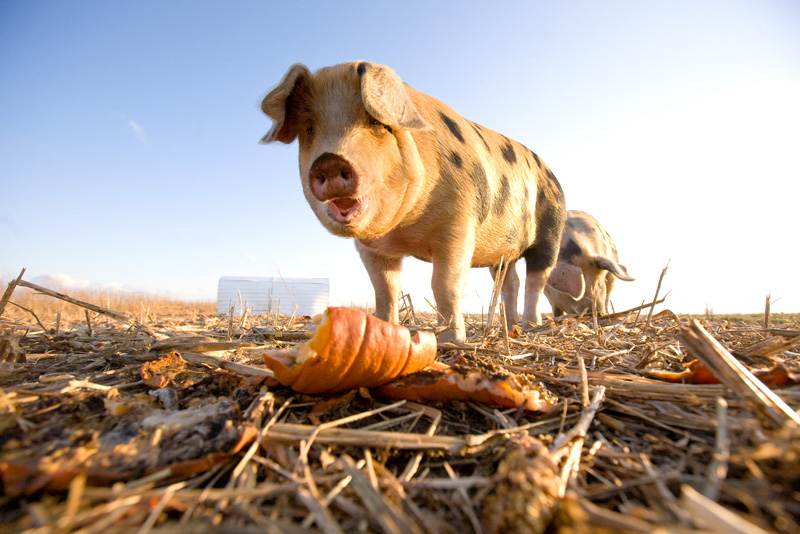There’s nothing like sinking your teeth into a nice juicy steak, making a mess of yourself with a sublime pulled-pork sandwich or enjoying a thick lamb burger. Your body sometimes craves an extra boost of iron, but on the Vineyard, more often than not, it hasn’t come from an Island source.
Sorry vegetarians, this story is not for you.
Vegetables usually take the main stage when we talk about eating locally, but with a feasibility study underway to evaluate a potential United States Department of Agriculture (USDA) four-legged animal humane slaughter facility on the Vineyard, this could change.
After the success of the mobile poultry processing unit, the Island Grown Initiative received a $40,000 grant from the state rural business enterprise program this past June to start the feasibility study. Tomorrow at the Martha’s Vineyard Agricultural Society hall in West Tisbury, Island Grown will hold an all-you-can-eat fundraiser, with Island poultry and pork, to bolster the grant.
“With the feasibility study, we can really exercise due diligence as a community to figure out what we need for our farmers today and how we build for the future,” Island Grown director Ali Berlow said earlier this week. “Our experience from the poultry program has shown us if there’s an option, animal farmers can respond by increasing animal production.”
The outcome of the study will determine a few factors including the size, cost, demand and market value of the meat processed as well as employment opportunities. Island Grown hopes to have the study completed by next summer.
“We’re looking outside of our community to see how other communities have responded to similar situations,” Mrs. Berlow said, noting a similar project on Lopez Island in Washington. This winter, Island Grown representatives will visit Lopez Island to get a better idea of how a successful program works. “There are great resources within the country from people who have been through this before.”
Island Grown selected Lopez Island as a good model because of similar issues — both locations are islands and are sheep-driven. The Vineyard raises more pigs and cattle, though. Mrs. Berlow said they will look regionally as well, including the Hudson Valley and New England for pointers on how to help develop the Island meat system.
In addition to what the facility will physically look like and process, the study will focus on the business side of slaughtering. Richard Andre of Cleveland Farm in West Tisbury recently brought three hogs off-Island to a slaughter facility in Athol. He drove over 300 miles and spent nearly $1,000 to have his pigs processed for this weekend’s event.
Mr. Andre estimates using an Island facility would cut that cost in half.
“But it’s not just cost savings,” Mr. Andre said. “People will buy local meat because they know whom they’re buying it from and how it was raised. The biggest thing is to make it more accessible and have it priced competitively.”
A USDA-certified facility requires a federal meat inspector to be present when the animal slaughter takes place. This enables the meat to be sold commercially. One of the reasons the poultry program took off this summer (from a few hundred birds processed to 5,000 this season) was that an inspector isn’t required to be present.
Mr. Andre said one possibility is to open the facility for a few months of the year and have a USDA inspector come down during the week to oversee the slaughtering. The other option is to have the USDA appoint a local authority to oversee the facility. But because this is an entirely new ball game for the Island Grown group, they’re looking to the feasibility study for answers.
“The whole basis of this was if you had the right infrastructure people will raise the food,” Mr. Andre said. He is excited about the prospect of creating new agriculture jobs through the facility, including bringing back the art of butchering. “We want to keep it local, keep the money local and control it locally.”
Bringing animals off-Island to be processed is not only costly but also adds stress to the animals. Jan Buhrman of Kitchen Porch catering no longer sends her hogs off-Island because the last time she did, her animals were at the facility for three days without being fed before they were slaughtered.
“I believe a slaughter facility on the Vineyard would honor their life and we’ll be able to go there and have a first-hand experience,” she said. “In having a facility we’re raising awareness of the importance of meat.”
As for the higher costs, Ms. Buhrman said she’d rather have a high price tag than not know the animal’s history.
Ms. Buhrman and her husband Rich Osnoss slaughtered their three pigs two weeks ago to have meat for the winter. While they don’t like the actual act of killing of the animals (Mr. Osnoss requests no one watch him as he does it), they appreciate knowing the pigs had a good life and a safe death.
“Handling death, even if it’s not a pleasant experience, it’s an honoring experience,” Ms. Buhrman said. “I’d rather do that and have my own meat and not be able to sell it than send it off to a facility.”
Saturday’s event is meant to begin an open dialogue about how a slaughter facility on the Island would impact the community at large. It is also meant to satisfy bellies with all-you-can-eat meat from Mr. Andre’s farm and the Farm Institute, chickens from the Good Farm and sides from Morning Glory Farm and the Scottish Bakehouse. Local Smoke will be cooking starting at 4 p.m., with music by the Eric Johnson Trio and DJ Di.
And save room for dessert — Tisberry Frozen Yogurt and smoothies will be made with Mermaid Farm’s homemade yogurt.
“We want to raise awareness and answer people’s questions,” Mrs. Berlow said. “We want this to be transparent and there’s a lot of excitement. We’ll all be there.”
Local Meat is Good to Eat is from 4 to 9 p.m. at the Martha’s Vineyard Agricultural Society Hall in West Tisbury. The cost is $50 per person or $75 for a couple. Tickets are available at Cronig’s, Alley’s General Store and the Scottish Bakehouse.





Comments
Comment policy »